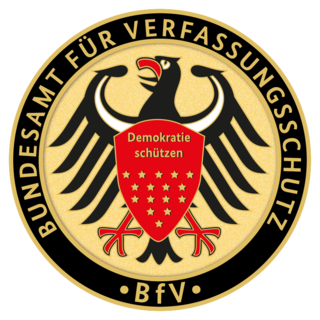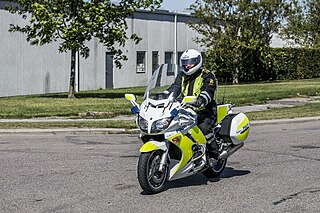
Counterterrorism, also known as anti-terrorism, relates to the practices, military tactics, techniques, and strategies that governments, law enforcement, businesses, and intelligence agencies use to combat or eliminate terrorism.

Counterintelligence (counter-intelligence) or counterespionage (counter-espionage) is any activity aimed at protecting an agency's intelligence program from an opposition's intelligence service. It includes gathering information and conducting activities to prevent espionage, sabotage, assassinations or other intelligence activities conducted by, for, or on behalf of foreign powers, organizations or persons.

The Swedish Security Service is a Swedish government agency organized under the Ministry of Justice. It operates as a security agency responsible for counter-espionage, counter-terrorism, as well as the protection of dignitaries and the constitution. The Swedish Security Service is also tasked with investigating crimes against national security and terrorist crimes. Its main mission, however, is to prevent crimes, not to investigate them. Crime prevention is to a large extent based on information acquired via contacts with the regular police force, other authorities and organisations, foreign intelligence and security services, and with the use of various intelligence gathering activities, including interrogations, telephone tapping, covert listening devices, and hidden surveillance cameras.
Terrorism and mass attacks in Canada includes acts of terrorism, as well as mass shootings, vehicle-ramming attacks, mass stabbings, and other such acts committed in Canada that people may associate with terroristic tactics but have not been classified as terrorism by the Canadian legal system.

The Federal Office for the Protection of the Constitution is Germany's federal domestic intelligence agency. Together with the Landesämter für Verfassungsschutz (LfV) at the state level, the federal agency is tasked with intelligence-gathering on efforts against the liberal democratic basic order, the existence and security of the federation or one of its states, and the peaceful coexistence of peoples; with counter-intelligence; and with protective security and counter-sabotage. The BfV reports to the Federal Ministry of the Interior and tasks and powers are regulated in the Bundesverfassungsschutzgesetz. The President is Thomas Haldenwang; he was appointed in 2018.

The Danish Defence Intelligence Service, DDIS, is a Danish intelligence agency, responsible for Denmark’s foreign intelligence, as well as being the Danish military intelligence service. DDIS is an agency under the Ministry of Defence and works under the responsibility of the Minister of Defence. It is housed at Kastellet, Copenhagen.
The State Security Service (VSSE) (known in Dutch as Staatsveiligheid; French: Sûreté de l'État) is a Belgian intelligence and security agency. Established in 1830, it is the oldest intelligence service except for the Holy See's. The State Security is a civilian agency under the authority of the Ministry of Justice, while the military intelligence agency, the General Information and Security Service, operates under the authority of the Ministry of Defense. The current Administrator-General is Jaak Raes, after his predecessor Alain Winants occupied the position between 2006 and 2014. The VSSE takes part in a number of international intelligence cooperative relationships, such as the Club de Berne and the CTG. It has contacts with over 90 sister services across four continents.

The Arab Struggle Movement for the Liberation of Ahwaz is an Arab nationalist and separatist insurgent group which advocates the secession of an area in southern Iran including all of Khuzestan Province and Bushehr Province and parts of Ilam Province, Hormozgan Province, Chaharmahal and Bakhtiari Province and Kohgiluyeh and Boyer-Ahmad Province from Iran and the establishment of an Arab state, a goal which it is attempting to achieve by waging a direct and violent conflict against Iran. The claimed area is shown in the group’s logo as well.

The National Police of Denmark is the upper most level of the Police of Denmark within the Kingdom. Administered by a framework of laws dictated by the Folketing and the government's Minister for Justice, Rigspolitiet polices all regions governed by Denmark, including the Faroe Islands and Greenland.
Law enforcement in Denmark is handled by a number of organisations, under the resort of various ministries:
The Vollsmose terrorists were three men convicted of attempted terrorism in Denmark in 2007–2008. Nine men were initially arrested by Danish police in the Vollsmose neighbourhood of Odense on 5 September 2006, but most were later released without charges, including a police mole who played a role in the investigation and trial. Four men were charged with attempted terrorism, three of whom were convicted. According to Danish police, the group had been under investigation for quite a while.
Danish Front was an extreme right, nationalist network in Denmark, whose goal was to "keep Denmark for the Danish people", thus they were also against multiculturalism and "alien religions" such as Islam.
The counter-terrorism page primarily deals with special police or military organizations that carry out arrest or direct combat with terrorists. This page deals with the other aspects of counter-terrorism:

The Police of Denmark is the Danish National Police force, and the interior part of the Danish security forces in the Kingdom. The police are empowered to enforce the law and to effect public and social order, as well as being responsible for border control.

Counter Terrorism Policing is the national collaboration of police forces working to prevent, deter, and investigate terrorism in the United Kingdom.
The Department of Home Affairs is the Australian Government interior ministry with responsibilities for national security, law enforcement, emergency management, border control, immigration, refugees, citizenship, transport security and multicultural affairs. The portfolio also includes federal agencies such as the Australian Border Force and the Australian Security Intelligence Organisation. The Home Affairs portfolio reports to the Minister for Home Affairs, currently held by Clare O'Neil, and was led by the Secretary of the Department of Home Affairs, Mike Pezzullo, until his sacking in November 2023 for breaching the code of conduct. In 2022, the Australian Federal Police, Australian Criminal Intelligence Commission and Australian Transaction and Analysis Center were de-merged from the department and moved to the Attorney General portfolio.
On 14 December 2023, Danish police arrested three people and charged a further four in absensia for conspiring to commit a terrorist attack in Denmark. One of the four was arrested in the Netherlands, but released. Five out of Denmark's 15 police departments took part in the operation. The three arrested in Denmark, two men and a younger woman, were put before preliminary questioning at around 7 pm. The judge ruled to give the defendants name protection and for the case to take place behind so-called "double closed doors", meaning the public will be restrained from access. The plot has been linked to the Danish gang Loyal to Familia.








